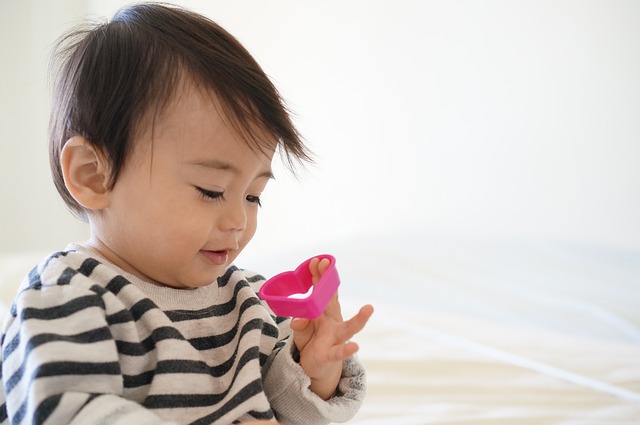The detection of a heart murmur invariably arouses great anxiety. This diagnosis is actually extremely common. In fact, many kids are found to have a heart murmur at some point during their lives. Most murmurs are not a cause for concern and do not affect the child’s health at all. However, sometimes, it is a sign of an underlying heart problem.

What is a heart murmur?
The normal heart has 4 chambers connected to each other by 4 valves that control how blood enters each chamber. The valves open and shut making the sound “lub-dub” that is recognized as a heart beat. A heart murmur describes an extra sound (“whooshing”, “swishing” or musical) that a doctor detects through a stethoscope. These can be discovered during regular check-ups or when the kids are sick.
An “innocent” (benign, functional, flow or physiological) murmur is caused by blood flowing through a normal heart. It does not cause a health threat as it does not result from heart disease.
A “non-innocent” (non-functional, organic or pathological) murmur indicates something abnormal in the heart or a major artery.
Causes of Innocent Murmurs
- Fever – The increase in body temperature and activity makes the heart pump more blood to meet the body’s higher energy needs.
- Venous hum – is heard as a soft humming sound from normal blood flow in the large neck vessels.
- A thin chest wall and a straight back – simply because the heart is closer to the chest wall.
- Still’s murmur – is heard most frequently in active healthy young children between 3 to 7 years of age and represents the sound of blood being pumped into the great artery.
- Anaemia – When the concentration of red blood cells is low, the blood will flow faster, giving rise to a murmur.
- Hyperthyroidism – is a condition where there is too much thyroid hormone in the body, resulting in a higher metabolic rate.
Common Causes of Non-innocent Murmurs
A hole in the heart is a communication in the wall (septum) that separates the right and left sides of the heart. If it is in between the upper heart chambers, it is called an atrial septal defect (ASD), and a ventricular septal defect (VSD) if it is in between the lower chambers. These account for more than half of abnormal murmurs in children. As the pressure in the heart chambers is not the same, the blood will flow from the high to the low-pressure chamber, producing the murmur.
Valve defects include:
- A narrowed heart valve (valve stenosis) resulting in faster flow to squeeze blood through, thus producing a murmur.
- A leaking heart valve (valve insufficiency or regurgitation) that does not close properly, giving rise to a blowing sound.

Symptoms & Signs Associated with Cardiac Effects
Most congenital heart defects are not severe and will not have any symptoms or signs. Pay special attention to the following warning signs:
- Your newborn turns blue, tires with feedings, breathes fast, sweats excessively or is not gaining weight
- Your toddler is not growing, having frequent lung infections or tires and gets short of breath with moderate activity.
- Your school-aged child or teenager complains of dizziness, fainting, easily tires or has shortness of breath during exercise.
Tests For Cardiac Effects
Your child will be referred to a paediatric cardiologist who may carry out the following –
- Electrocardiogram (ECG) – to measure the electrical activity of the heart.
- Chest X-ray – to see if the heart looks bigger than normal.
- Echocardiogram – (heart ultrasound) uses sound waves to make a picture of the heart as blood is pumped through the chambers and valves.
- Cardiac catheterization and angiography – is a procedure performed under sedation or anaesthesia, in which a thin flexible tube (catheter) is passed through an artery or vein in the upper thigh (groin) or in the arm to reach the heart. This allows measurement of pressures inside the heart and blood vessels. Angiography helps the doctor to see the flow of blood through the heart and blood vessels using a dye injection and X-rays.
Treatment of Heart Defects
Majority of heart defects do not need medications. Most kids need not be restricted in their activities. Medicines may be prescribed to help the heart function, prevent blood clots or remove extra fluid from the body. In some cases, surgery is necessary to fix the problem. The heart specialist or surgeon can patch a hole in the heart, fix a valve, rebuild a blood vessel, or stretch a blood vessel that is too narrow.
Dr Chan Kit Yee, Paediatrician, Special Interest in Cardiology, SBCC Baby & Child Clinic (Mount Alvernia).
Dr Chan graduated from the National University of Singapore with a Bachelor of Medicine and Bachelor of Surgery degree in 1981 and obtained her Masters of Medicine (Paediatrics), Singapore, in 1986. She was a Consultant Paediatrician and Senior Lecturer with the Department of Paediatrics, National University Hospital, until 1993 when she joined SBCC Baby & Child Clinic and has been the resident paediatrician and paediatric cardiologist in its Mount Alvernia Centre for the past 7 years.
* * * * *
Like what you see here? Get parenting tips and stories straight to your inbox! Join our mailing list here.
Want to be heard 👂 and seen 👀 by over 100,000 parents in Singapore? We can help! Leave your contact here and we’ll be in touch.

















































Leave a Comment: